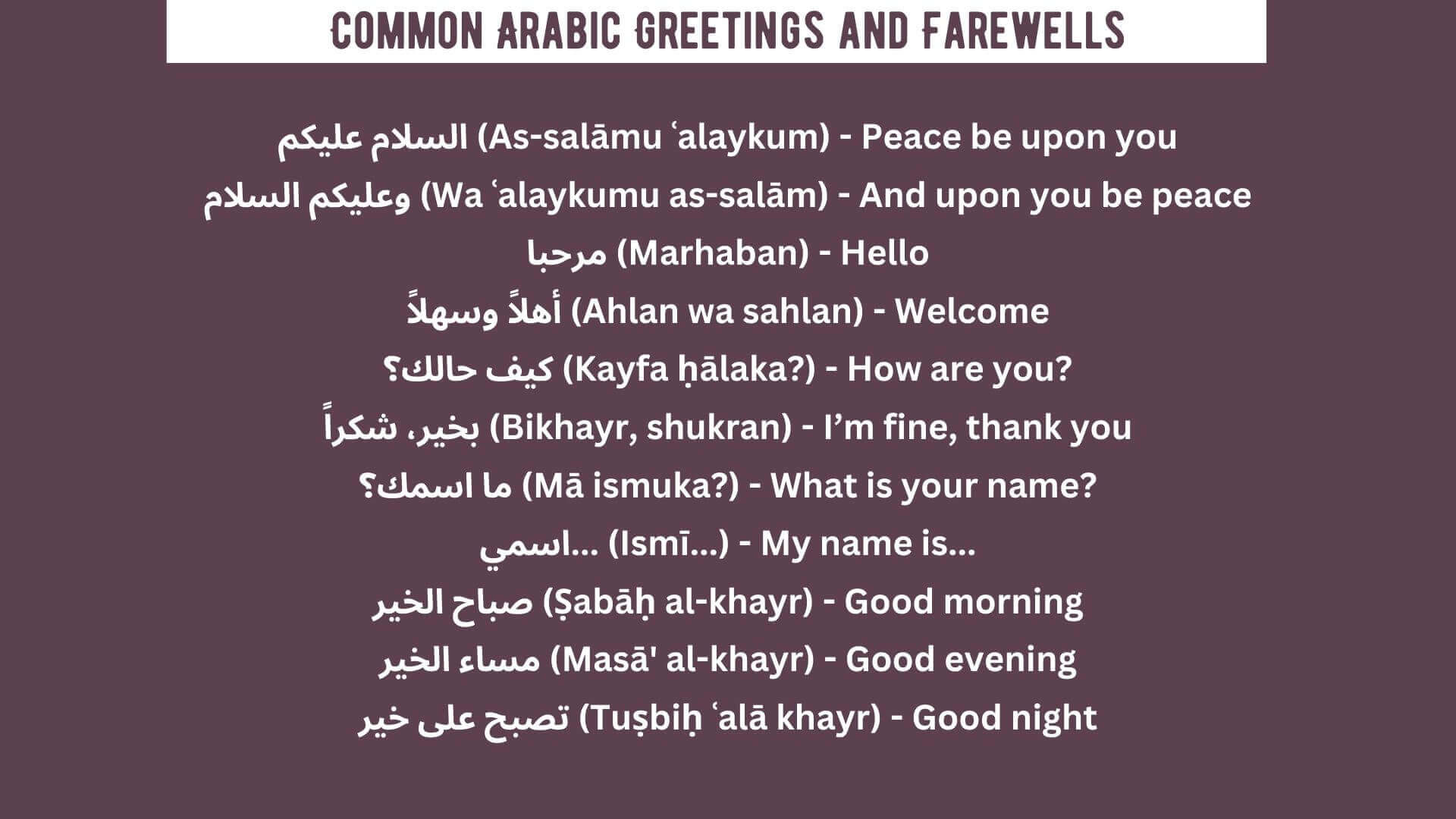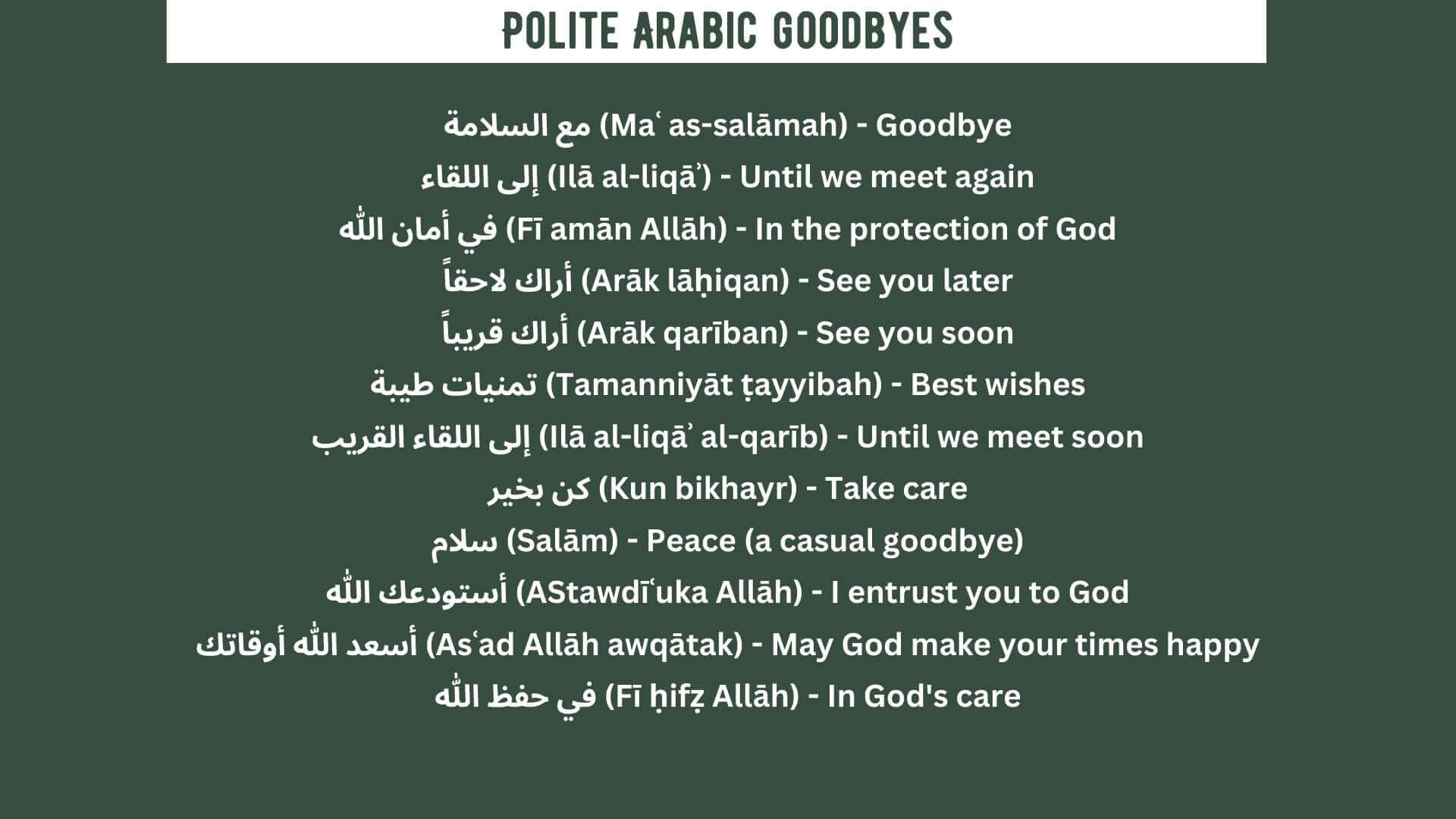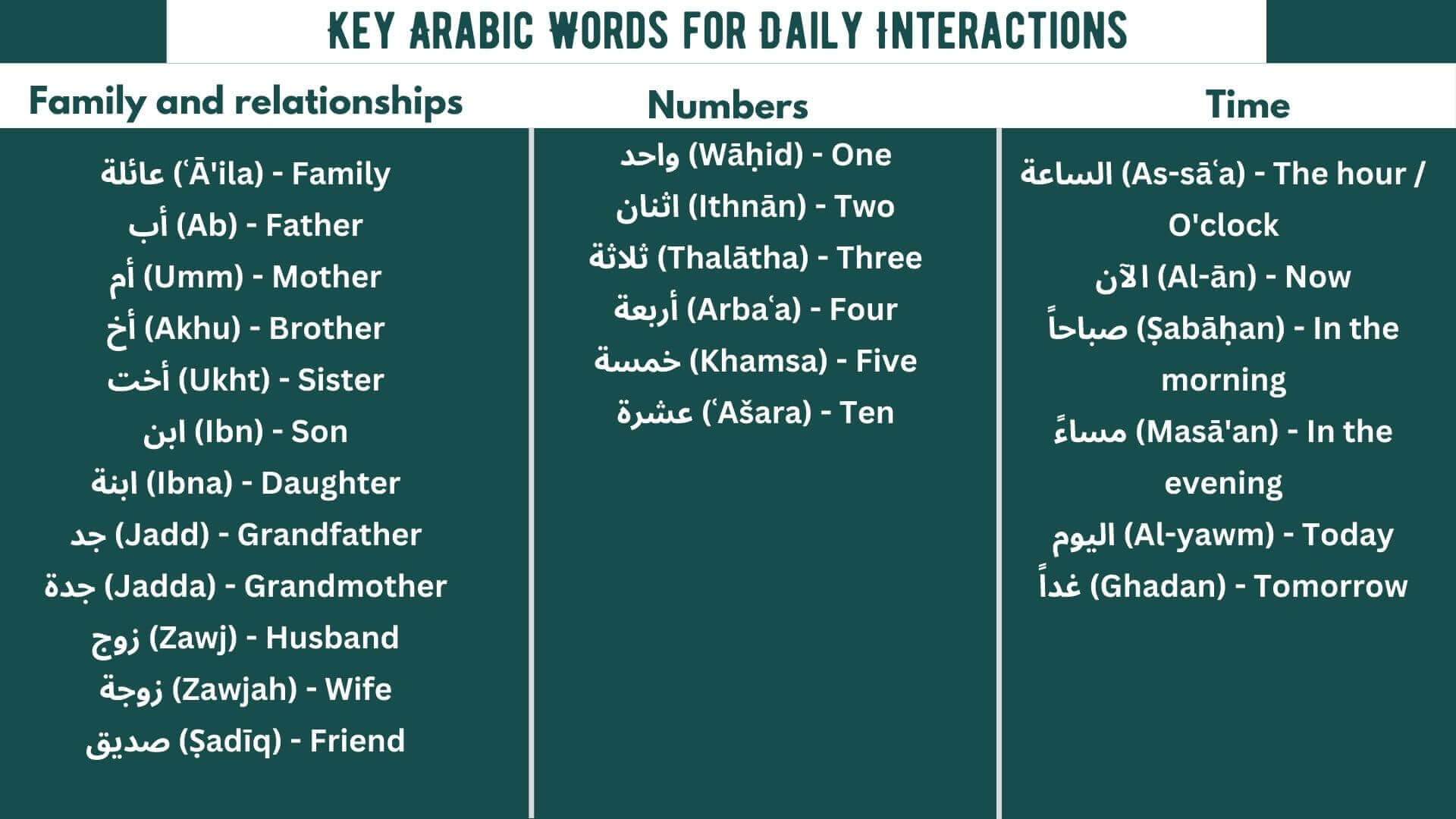Learning basic vocabulary is key to communicating well in any language. The guide, ‘111+ Arabic Words – Core Arabic Words To Get You Familiar With The Language,’ is a great starting point for beginners. It lists important words and phrases you need for everyday conversations in Arabic. This makes it easier for learners to talk and understand others in Arabic-speaking places.
While going through these words, you might wonder how such a simple list can help you fit in better in the Arab world. Think about which everyday situations you could use these words in. How would knowing them change your experience as a beginner?
Essential Arabic Greetings and Farewells
Common Greetings
Learning a few basic Arabic greetings can really improve your ability to chat and connect with others. Start with ‘As-salamu alaykum’ which means ‘Peace be upon you’ and ‘Marhaban’ which means ‘Hello’. These phrases are well-known and respected. Another good one is ‘Sabah al-khair’ or ‘Good morning’, especially useful in the morning to show politeness. These phrases are easy to pick up and can help you make a great first impression. They’re key to starting conversations that can lead to more meaningful exchanges in any Arabic-speaking setting.

- السلام عليكم (As-salāmu ʿalaykum) – Peace be upon you
- وعليكم السلام (Wa ʿalaykumu as-salām) – And upon you be peace
- مرحبا (Marhaban) – Hello
- أهلاً وسهلاً (Ahlan wa sahlan) – Welcome
- كيف حالك؟ (Kayfa ḥālaka?) – How are you?
- بخير، شكراً (Bikhayr, shukran) – I’m fine, thank you
- ما اسمك؟ (Mā ismuka?) – What is your name?
- اسمي… (Ismī…) – My name is…
- صباح الخير (Ṣabāḥ al-khayr) – Good morning
- مساء الخير (Masā’ al-khayr) – Good evening
- تصبح على خير (Tuṣbiḥ ʿalā khayr) – Good night
Polite Goodbyes
When we dive into Arabic greetings, it’s just as crucial to know how to say goodbye politely. The go-to farewell in Arabic is ‘ma’a as-salama,’ which means ‘go with safety’ or simply ‘farewell.’ Another popular phrase is ‘ila al-liqaa,’ meaning ‘until we meet again.’ This suggests you’re looking forward to seeing the person again. These phrases are well-known across Arabic-speaking areas and fit both casual and formal settings.
It’s also nice to add a wish for the person’s well-being, like ‘fi aman Allah,’ which translates to ‘in God’s protection.’ This adds a personal touch and shows you care. Getting these phrases down can really enhance how you come across and leave a great impression.

- مع السلامة (Maʿ as-salāmah) – Goodbye
- إلى اللقاء (Ilā al-liqāʾ) – Until we meet again
- في أمان الله (Fī amān Allāh) – In the protection of God
- أراك لاحقاً (Arāk lāḥiqan) – See you later
- أراك قريباً (Arāk qarīban) – See you soon
- تمنيات طيبة (Tamanniyāt ṭayyibah) – Best wishes
- إلى اللقاء القريب (Ilā al-liqāʾ al-qarīb) – Until we meet soon
- كن بخير (Kun bikhayr) – Take care
- سلام (Salām) – Peace (a casual goodbye)
- أستودعك الله (AStawdīʿuka Allāh) – I entrust you to God
- أسعد الله أوقاتك (Asʿad Allāh awqātak) – May God make your times happy
- في حفظ الله (Fī ḥifẓ Allāh) – In God’s care
Everyday Useful Phrases
Basic Questions and Phrases
Knowing simple questions and phrases is key to communicating well in Arabic. It’s important to get a handle on these basics for everyday chats. For instance, asking ‘ما اسمك؟’ (What is your name?) and ‘كيف حالك؟’ (How are you?) are great ways to start a conversation. You can reply with ‘اسمي…’ (My name is…) or ‘أنا بخير, شكرا’ (I am fine, thank you) to keep the chat going.
These phrases do more than just help you talk about simple things. They also let you share how you feel or what you need, like saying ‘أنا جائع’ (I am hungry) or ‘أنا مسرور’ (I am pleased). Using these phrases right can really make a difference. You’re not just talking; you’re also connecting with others and understanding more about their culture. This opens up more chances for deeper conversations and relationships in Arabic-speaking communities.
- ما هذا؟ (Mā hādhā?) – What is this?
- أين؟ (Ayn?) – Where?
- متى؟ (Matā?) – When?
- لماذا؟ (Limādhā?) – Why?
- كيف؟ (Kayfa?) – How?
- كم؟ (Kam?) – How much? / How many?
- هل أنت بخير؟ (Hal anta bikhayr?) – Are you okay?
- أفهم. (Afham) – I understand.
- لا أفهم. (Lā afham) – I don’t understand.
- هل يمكنك مساعدتي؟ (Hal yumkinuka musāʿadatī?) – Can you help me?
- أحب هذا. (Uḥibb hādhā) – I like this.
Shopping Vocabulary
Knowing a few basic shopping phrases in Arabic can make your time at the market more enjoyable and help you connect with local sellers. Start with ‘كم الثمن؟’ (Kam al-thaman?), which means ‘How much is this?’ It’s handy when you want to know the price. If you’re looking to negotiate, you can ask ‘أقل شوية؟’ (Aqall shwayya?), or ‘Can you make it less?’ When you decide you want something, say ‘أريد هذا’ (Ureed hatha), which translates to ‘I want this.’ To wrap up your purchase, use ‘سأشتريه’ (Saashtareeh), or ‘I will buy it.’ These phrases are not just practical; they also show that you respect and appreciate the local culture and language.
- سوق (Sūq) – Market
- متجر (Matjar) – Store / Shop
- سعر (Siʿr) – Price
- كم ثمنه؟ (Kam thamanuh?) – How much does it cost?
- أريد (Urīd) – I want
- شراء (Shirāʾ) – Purchase / Buying
- خصم (Khaṣm) – Discount
- منتج (Muntaj) – Product
- حقيبة (Ḥaqība) – Bag
- مقاس (Maqās) – Size
- قائمة الشراء (Qā’imat al-shirāʾ) – Shopping list
- تجربة (Tajribah) – Fitting (as in trying on clothes)
Asking for Help
When you’re in Arabic-speaking areas, knowing how to ask for help makes a big difference. Start with simple requests like ‘Min fadlik, sa‘idni’ (Please, help me) and ‘Hal yumkinuka musa‘adati?’ (Can you help me?).
If you’re lost or need directions, asking ‘Ayna al-mustashfa?’ (Where is the hospital?) or ‘Ayna al-mat‘am?’ (Where is the restaurant?) can guide you to the right place. In emergencies, it’s crucial to know phrases like ‘I need a doctor’ (Ahtaaj ila tabeeb) and ‘Call an ambulance’ (Ittas‘il bi ambulans). Learning these phrases shows you respect the culture and are trying to fit in. It also prepares you for everyday situations.
- ممكن مساعدتي؟ (Mumkin musāʿadatī?) – Can you help me?
- أحتاج إلى المساعدة. (Aḥtāj ilā al-muʿāna) – I need help.
- هل يمكنك مساعدتي؟ (Hal yumkinuka musāʿadatī?) – Can you assist me?
- أين يمكنني العثور على…؟ (Ayn yumkinunī al-ʿuthūr ʿalā…?) – Where can I find…?
- هل تستطيع مساعدتي في هذا؟ (Hal taṣtaṭīʿ musāʿadatī fī hādhā?) – Can you help me with this?
- أحتاج إلى معلومات عن… (Aḥtāj ilā maʿlūmāt ʿan… ) – I need information about…
- كيف يمكنني…؟ (Kayfa yumkinunī…?) – How can I…?
- هل يمكنك توجيهي؟ (Hal yumkinuka tawjīhī?) – Can you guide me?
- أين أجد…؟ (Ayn ajid…?) – Where do I find…?
- هل يمكنك إخباري عن…؟ (Hal yumkinuka ikhbārī ʿan…?) – Can you tell me about…?
- أنا في حاجة إلى المساعدة. (Anā fī ḥāja ilā al-muʿāna.) – I am in need of help.
- يرجى مساعدتي. (Yurjā musāʿadatī.) – Please help me.
Also Read: How to Say “I Love You” in Arabic: A Guide to Different Dialects
Key Arabic Words for Daily Interactions

Family and Relationships
Knowing some basic Arabic words for family and relationships is really helpful when you’re interacting with Arabic-speaking people. Family is called ‘عائلة’ (‘ā’ilah) and it’s a big deal in their culture. Being able to talk about it can bring you closer to others. Here are some important words:
‘أب’ (ab) means father, ‘أم’ (umm) is mother, ‘ابن’ (ibn) for son, and ‘ابنة’ (ibnah) for daughter. Then there’s ‘زوج’ (zawj) for husband and ‘زوجة’ (zawjah) for wife. Also, ‘صديق’ (sadiq) means friend, and friends are important, right?
Using these words not only helps you communicate but also shows you respect their culture. It’s a great way to strengthen friendships and fit in better with the community.
- عائلة (ʿĀ’ila) – Family
- أب (Ab) – Father
- أم (Umm) – Mother
- أخ (Akhu) – Brother
- أخت (Ukht) – Sister
- ابن (Ibn) – Son
- ابنة (Ibna) – Daughter
- جد (Jadd) – Grandfather
- جدة (Jadda) – Grandmother
- زوج (Zawj) – Husband
- زوجة (Zawjah) – Wife
- صديق (Ṣadīq) – Friend
Numbers and Time
Just like knowing family terms, learning numbers and time-related words is very helpful in Arabic. Numbers are crucial for buying things, making plans, and talking about amounts. Important numbers are ‘واحد’ (one), ‘اثنان’ (two), and ‘عشرة’ (ten).
For time, words like ‘الساعة’ (hour) and ‘دقيقة’ (minute) are key. If you want to ask the time, you say ‘كم الساعة؟’ (What time is it?). Knowing the days of the week is useful too, such as ‘الأحد’ (Sunday) and ‘الاثنين’ (Monday). This vocabulary isn’t just useful day-to-day; it also helps you connect more deeply with Arabic speakers.
Numbers (1-10)
- واحد (Wāḥid) – One
- اثنان (Ithnān) – Two
- ثلاثة (Thalātha) – Three
- أربعة (Arbaʿa) – Four
- خمسة (Khamsa) – Five
- ستة (Sitta) – Six
- سبعة (Sabʿa) – Seven
- ثمانية (Thamāniya) – Eight
- تسعة (Tisʿa) – Nine
- عشرة (ʿAšara) – Ten
Multiples of 10
- عشرة (ʿAšara) – Ten
- عشرون (ʿIshrūn) – Twenty
- ثلاثون (Thalāthūn) – Thirty
- أربعون (Arbaʿūn) – Forty
- خمسون (Khamsūn) – Fifty
- ستون (Sittūn) – Sixty
- سبعون (Sabʿūn) – Seventy
- ثمانون (Thamānūn) – Eighty
- تسعون (Tisʿūn) – Ninety
- مئة (Miʾa) – One hundred
Time
- الساعة (As-sāʿa) – The hour / O’clock
- الآن (Al-ān) – Now
- صباحاً (Ṣabāḥan) – In the morning
- مساءً (Masā’an) – In the evening
- اليوم (Al-yawm) – Today
- غداً (Ghadan) – Tomorrow
Commonly Used Arabic Adjectives and Adverbs
Describing People and Places
Adjectives and adverbs are key to painting clear pictures with words. Words like ‘beautiful,’ ‘big,’ and ‘old’ help describe scenes and people clearly. For movement, words like ‘slowly,’ ‘quickly,’ and ‘quietly’ add detail to actions. These words are crucial for storytelling, making it engaging and informative.
Take a marketplace, for example. Call it ‘noisy,’ and you instantly imagine a place full of life and activity. By choosing the right words, you communicate effectively, which is vital, whether you’re chatting casually or writing something more formal.
- بسرعة (Bisurʿa) – Quickly
- جيداً (Jayyidan) – Well
- دوماً (Dawman) – Always
- أحياناً (Aḥyānan) – Sometimes
- جميل (Jamīl) – Beautiful
- قبيح (Qabīḥ) – Ugly
- عالي (ʿĀlī) – High / Tall
- منخفض (Munḩafiḍ) – Low
- كبير (Kabīr) – Big / Large
- صغير (Ṣaghīr) – Small / Little
Expressing Feelings and Opinions
When you talk about how you feel or what you think in Arabic, you often use a lot of descriptive words. Words like ‘سعيد’ (sa’eed, meaning happy), ‘حزين’ (hazeen, meaning sad), ‘غاضب’ (ghadhab, meaning angry), and ‘متحمس’ (mutahammis, meaning excited) are very important. Other words, like ‘جداً’ (jiddan, meaning very) and ‘أبداً’ (abadan, meaning never), help give more detail to what you are saying.
These words help make sure you are understood clearly, which is crucial, right? Whether you’re chatting with a friend or discussing something at work, knowing how to express your emotions or opinions well can really make a difference. It’s all about being clear and straightforward, which helps in just about any conversation.
- سعيد (Saʿīd) – Happy
- حزين (Ḥazīn) – Sad
- متحمس (Mutaḥammis) – Excited
- غاضب (Ghāḍib) – Angry
- مرتاح (Murṭāḥ) – Comfortable / Relaxed
- خائف (Khā’if) – Afraid
- بشكل عام (Bi-shakl ʿām) – Generally
- حقاً (Ḥaqan) – Truly / Really
- بوضوح (Bi-wuḍūḥ) – Clearly
- بإخلاص (Bi-ikhlāṣ) – Sincerely
- ببطء (Bi-baṭʾ) – Slowly
Arabic Words for Emergency and Health
Health Issues
Learning basic Arabic words for health and emergencies can really help during critical times. For health talks, it’s good to know words like ‘صحة’ (sihha, health), ‘طبيب’ (tabeeb, doctor), ‘مستشفى’ (mustashfa, hospital), ‘صيدلية’ (saydaliya, pharmacy), and ‘ألم’ (alam, pain). These words make it easier to communicate with doctors and nurses, especially in urgent situations.
Also, phrases like ‘أحتاج طبيباً’ (ahtaaj tabeeban, I need a doctor) and ‘أين المستشفى؟’ (ayna al-mustashfa?, Where is the hospital?) are very useful. Knowing these can help you get help faster when you really need it.
- مرض (Marḍ) – Illness / Disease
- حمى (Ḥummā) – Fever
- صداع (Ṣudāʿ) – Headache
- سعال (Suʿāl) – Cough
- زكام (Zukām) – Cold
- غثيان (Ghaythiyān) – Nausea
- ألم (Alam) – Pain
- إعياء (Iʿyāʾ) – Fatigue / Exhaustion
- سكري (Sukkari) – Diabetes
- ضغط دم (Ḍaght dam) – Blood pressure
- حساسية (Ḥasāsiyya) – Allergy
- علاج (ʿIlāj) – Treatment
Also Read: Interesting Facts About the Arabic
Emergency Situations
Knowing basic Arabic words for health and emergencies can really help when you need to communicate quickly. Knowing these words can make a big difference. They help you talk to doctors and emergency workers quickly and effectively, making sure you get the care you need right away. It’s really useful to know this vocabulary if you’re in an Arabic-speaking place and health issues come up.
- طوارئ (Ṭawāriʾ) – Emergency
- مساعدة (Musāʿada) – Help
- نجدة (Najda) – Rescue
- إسعاف (Isʿāf) – Ambulance
- حريق (Ḥarīq) – Fire
- حادث (Ḥādith) – Accident
- إصابة (Iṣāba) – Injury
- خطير (Khaṭīr) – Dangerous
- مريض (Marīḍ) – Patient / Sick person
- مستشفى (Mustashfā) – Hospital
- طبيب (Ṭabīb) – Doctor
- تحذير (Taḥdhīr) – Warning
Conclusion
The resource ‘111+ Arabic Words – Core Arabic Words To Get You Familiar With The Language’ is a great tool for beginners. Knowing these words helps you communicate and understand the culture better, making your interactions richer. Keep building your vocabulary and practice regularly. Use different tools like apps and talk with native speakers to improve. Remember, learning a language takes time, so stay curious and patient. Every new word brings you closer to fluency and connects you with millions of Arabic speakers around the world. Keep visiting the Translation Blog for more articles like this.

